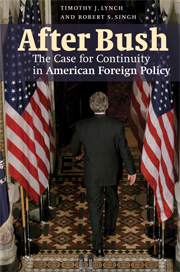Book contents
- Frontmatter
- Contents
- List of figures
- Acknowledgements
- Introduction: Winning the Second Cold War
- Chapter 1 Bush and the American foreign policy tradition
- Chapter 2 The constitution of American national security
- Chapter 3 The Second Cold War on Islamist terror: negative audits
- Chapter 4 The Second Cold War on Islamist terror: a positive audit
- Chapter 5 Iraq: Vietnam in the sand?
- Chapter 6 The Middle East: reformation or Armageddon
- Chapter 7 Frineds and foes after Bush
- Chapter 8 The emerging consensus at home and aborad
- Conclusion: The case for contiuity
- Notes
- Bibliography
- Index
Chapter 6 - The Middle East: reformation or Armageddon
Published online by Cambridge University Press: 22 September 2009
- Frontmatter
- Contents
- List of figures
- Acknowledgements
- Introduction: Winning the Second Cold War
- Chapter 1 Bush and the American foreign policy tradition
- Chapter 2 The constitution of American national security
- Chapter 3 The Second Cold War on Islamist terror: negative audits
- Chapter 4 The Second Cold War on Islamist terror: a positive audit
- Chapter 5 Iraq: Vietnam in the sand?
- Chapter 6 The Middle East: reformation or Armageddon
- Chapter 7 Frineds and foes after Bush
- Chapter 8 The emerging consensus at home and aborad
- Conclusion: The case for contiuity
- Notes
- Bibliography
- Index
Summary
Nuclear arms in the Middle East
Israel's attacking the Iraqis
The Syrians are mad at the Lebanese
And Baghdad does whatever she please
Looks like another threat to world peace
For the envoy
Warren Zevon, The Envoy (1981)The main concern of fundamentalist Islam is with moderate Islam, and especially those Islamic states which, if they have not precisely embraced democracy, have nevertheless tried to banish theocracy from the business of government. That fundamentalism loathes the Western democracies goes without saying: or rather, it goes with a lot of saying, at the top of the voice. But the real horror, for the diehard theocrats, is the country with a large number of Muslims that has been infiltrated by the liberal ideas of the West. As a rule of thumb, you can say that the terrorists would like to wreak edifying vengeance on any predominantly Islamic country where you can see even a small part of a woman's face.
Clive James, ‘A Nightclub in Bali’When you say ‘Islamic terrorists,’ the only people you're insulting are … Islamic terrorists. And really, we don't care if we insult them.
Rudy GiulianiWhy is foreign aid not contingent upon warning recipient states that they will forfeit it if clerics they subsidize preach hatred of the West? Why aren't we helping Afghanistan or Pakistan to build secular alternatives to the Saudi-financed madrassas where children are brainwashed with cartoon Jew killers?
- Type
- Chapter
- Information
- After BushThe Case for Continuity in American Foreign Policy, pp. 189 - 226Publisher: Cambridge University PressPrint publication year: 2008



